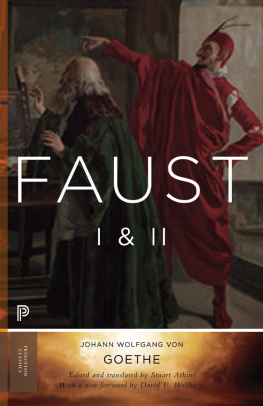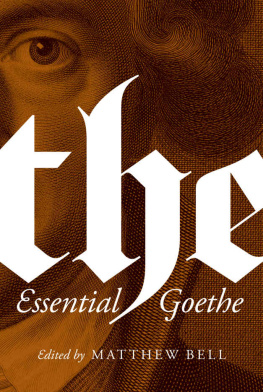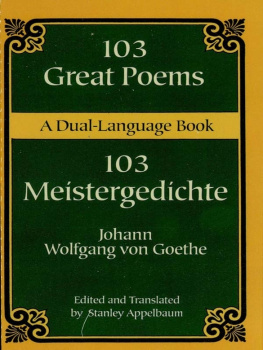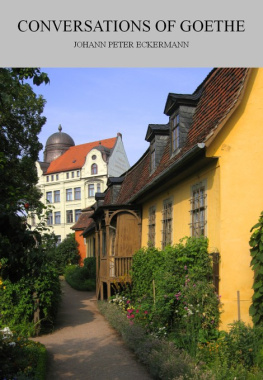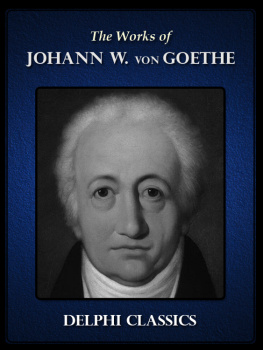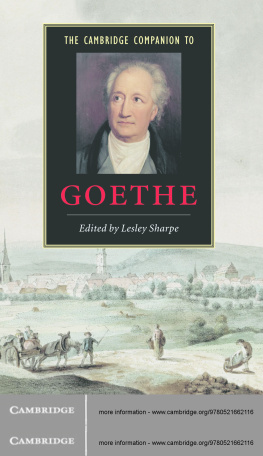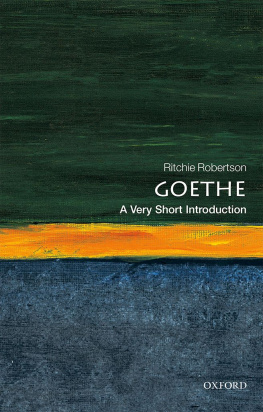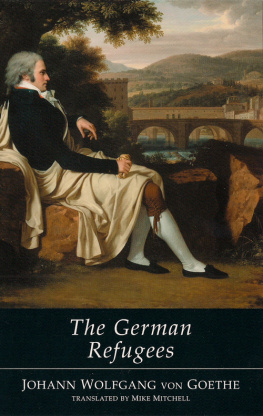Johann Wolfgang von Goethe - Faust I & II
Here you can read online Johann Wolfgang von Goethe - Faust I & II full text of the book (entire story) in english for free. Download pdf and epub, get meaning, cover and reviews about this ebook. year: 2014, publisher: Princeton University Press, genre: Romance novel. Description of the work, (preface) as well as reviews are available. Best literature library LitArk.com created for fans of good reading and offers a wide selection of genres:
Romance novel
Science fiction
Adventure
Detective
Science
History
Home and family
Prose
Art
Politics
Computer
Non-fiction
Religion
Business
Children
Humor
Choose a favorite category and find really read worthwhile books. Enjoy immersion in the world of imagination, feel the emotions of the characters or learn something new for yourself, make an fascinating discovery.
- Book:Faust I & II
- Author:
- Publisher:Princeton University Press
- Genre:
- Year:2014
- Rating:4 / 5
- Favourites:Add to favourites
- Your mark:
- 80
- 1
- 2
- 3
- 4
- 5
Faust I & II: summary, description and annotation
We offer to read an annotation, description, summary or preface (depends on what the author of the book "Faust I & II" wrote himself). If you haven't found the necessary information about the book — write in the comments, we will try to find it.
Johann Wolfgang von Goethe: author's other books
Who wrote Faust I & II? Find out the surname, the name of the author of the book and a list of all author's works by series.
Faust I & II — read online for free the complete book (whole text) full work
Below is the text of the book, divided by pages. System saving the place of the last page read, allows you to conveniently read the book "Faust I & II" online for free, without having to search again every time where you left off. Put a bookmark, and you can go to the page where you finished reading at any time.
Font size:
Interval:
Bookmark:

GOETHE FAUST I & II
GOETHE
SELECTED POEMS
FAUST I & II
ESSAYS ON ART AND LITERATURE
FROM MY LIFE: POETRY AND TRUTH (PARTS ONE TO THREE)
FROM MY LIFE: CAMPAIGN IN FRANCE 1792 SIEGE OF MAINZ (PART FOUR)
ITALIAN JOURNEY
EARLY VERSE DRAMAS AND PROSE PLAYS
VERSE PLAYS AND EPIC
WILHELM MEISTERS APPRENTICESHIP
CONVERSATIONS OF GERMAN REFUGEES & WILHELM MEISTERS
JOURNEYMAN YEAR OR THE RENUNCIANTS
THE SORROWS OF YOUNG WERTHER ELECTIVE AFFINITIES NOVELLA
SCIENTIFIC STUDIES

Collected Works in 12 Volumes
EXECUTIVE EDITORIAL BOARD
Victor Lange, Princeton University
Eric Blackall, Cornell University
Cyrus Hamlin, Yale University
Goethes Collected Works, Volume 2
Johann Wolfgang von
GOETHE
Faust I & II
Edited and Translated by Stuart Atkins
With a new introduction by David E. Wellbery
Princeton University Press
Princeton and Oxford
Published by Princeton University Press, 41 William Street,
Princeton, New Jersey 08540
In the United Kingdom by Princeton University Press, 6 Oxford Street,
Woodstock, Oxfordshire OX20 1TW
Copyright 1984 by Suhrkampnnsel Publishers, Boston, Inc.
Foreword to the Princeton Classics edition copyright 2014 by Princeton University Press
All Rights Reserved
Reprinted in paperback by arrangement with Suhrkamp Verlag
First Princeton Paperback printing, 1994
First Princeton Classics edition printing, 2014
Paperback ISBN 978-0-691-16229-4
Library of Congress Control Number: 93027617
Princeton University Press books are printed on acid-free paper and meet the guidelines for permanence and durability of the Committee on Production Guidelines for Book Longevity of the Council on Library Resources
press.princeton.edu
Printed in the United States of America
10 9 8 7 6 5 4 3 2 1
CONTENTS
)
)
)
)
)
)
INTRODUCTION
Due to its range and complexity, Goethes Faust invites metaphors of all-in-clusiveness. A vast continent, one is tempted to say, a world unto itself, a cosmos. World literature (a concept invented by Goethe) knows several en-compassing works, but their formal principles typically make for easy survey. Homers Iliad and Odyssey are epics in twenty-four books, a pattern mimicked in Vergils Aeneid, in which, of course, the number of books is halved. Dantes Divine Comedy unfolds in three parts, the cantos of each arranged according to theologically inspired symmetries. Miltons comparable world-historical poems yield cognate results. Moreover, all the mentioned works are cast in metrical patterns sustained from beginning to end. For Faust, a metrical jungle, no transparent principle of organization is available, and, for this reason, the reader engaging with the work for the first time (and the experienced reader, too) will do well to consult a map. Bare summary has its benefits. Thats where we shall start.
Faust consists of two large, but asymmetrical parts. The first divides into what has come to be known as the scholars tragedyFausts despair at attaining genuine knowledge, his near suicide, the formation of his alliance with the devil Mephistophelesand the Gretchen tragedyFausts illicit and disastrous love affair with Margarete, called Gretchen. Between these two segments are wedged two transitional scenes, the zany Witches Kitchen, in which the elderly Faust is rejuvenated by a magical potion, and the rowdy Auerbachs Wine Cellar in Leipzig, a drinking bout that spills into violence. These two scenes anticipate the Satanic festival of Walpurgis Night that provides the Gretchen tragedy with its sexual subtext while delaying, in good Shakespearean fashion, the onset of the final catastrophe. The scholars tragedy derives its internal coherence from Fausts mood swings, which find a kind of precarious stabilization in the agreement achieved between Faust and Mephistopheles. The Gretchen tragedy, by contrast, conducts the humble, inexperienced girl at its center to extremes of tragic experience worthy of an Oedipus or Lear.
of Faust is internally even more heterogeneous, consisting of five loosely connected acts, each of which takes place in a different sphere of experience. It opens with a scene titled A Pleasant Landscape that, although included within Act I, is clearly something like a metaphysical prelude to the entire second part. Faust, awakening from a healing sleep following the trauma of the Gretchen tragedy, attempts to look directly at the rising sun, the very source of life, but must turn away, temporarily blinded. This supplies the play with the central figure (blindness) of its tragic conclusion. Act I proper shows Faust at the Imperial Court, where, aided as always by Mephistopheles, he orchestrates entertainments, draws the shade of Helen of Troy from the abyss of the past, and pulls off a bit of financial wizardry (the invention of paper money).
. As pure mind, Homunculus has telepathic talents and he puts them to use interpreting for us the dream unfolding in the mind of the sleeping Faust. No latency here: Fausts oneiric vision pictures the conception of Helen in the coital embrace of the swan-disguised Zeus and the bathing Leda. That dream gives the dramatic action its direction. Act II concludes with an elaborate Classical Walpurgis Night in which Faust, Mephistopheles, and Homunculus make their way across a series of encounters with somewhat obscure mythical figures. Mephistopheles finds his ancient counter-part among the one-eyed, one-toothed Phorcides. Homunculus, rejecting his purely mental existence, smashes his vial on the mollusk shell that transports the lovely Galatea over the waves. Absent from the stage, Faust sets off in search of Helen.
In Act III of , Faust finds himself in ancient Greece, where, in the guise of a late-medieval lord, he is joined in love with the beautiful but ghostly Helen only to see their offspring, Euphorion, fall from the cliffs to his death, at which point Helen too disappears. The act begins in the mode of Attic tragedy, transitions to Renaissance pastoral, and concludes as opera. The aesthetic theories of Goethes time all revolved around the distinction between Classical (ancient) and Romantic (Christian, modern) forms of art and life. Viewed as a whole, Act III stages the momentary, but finally ill-fated synthesis of these historical-artistic worldviews. Act IV turns to the material forces that drive the modern world. Its subject is warfare and its dramatic action has Faust and Mephistopheles supply the technological and strategic innovations that secure victory for the emperors forces. Fausts reward for this service is a swath of land at seas edge, a province onto which he can impress his political will.
Consequently, in Act V Faust appears as a colonial lord who undertakes a vast project of engineering, both civilbuilding dikes to hold back the seasand sociala utopian community of autonomous individuals. But Mephistophelian forces are at work here as well: piracy, slave labor, infernal flames. All of this ends with the murder of the ancient couple Philemon and Baucis, for which Faust bears responsibility, and then Fausts own death, when, blinded by Care, he mistakes the sound of the gravediggers grim labor for the realization of his engineering enterprise. There follows a coda of sorts in which Fausts immortal part is snatched from Mephistopheles grasp and borne upward through a medieval hierarchy of souls toward what appears to be a guiding feminine principle. Margarete makes her return as a penitent Beatrice serving as Fausts heavenly advocate and guide.
Next pageFont size:
Interval:
Bookmark:
Similar books «Faust I & II»
Look at similar books to Faust I & II. We have selected literature similar in name and meaning in the hope of providing readers with more options to find new, interesting, not yet read works.
Discussion, reviews of the book Faust I & II and just readers' own opinions. Leave your comments, write what you think about the work, its meaning or the main characters. Specify what exactly you liked and what you didn't like, and why you think so.

